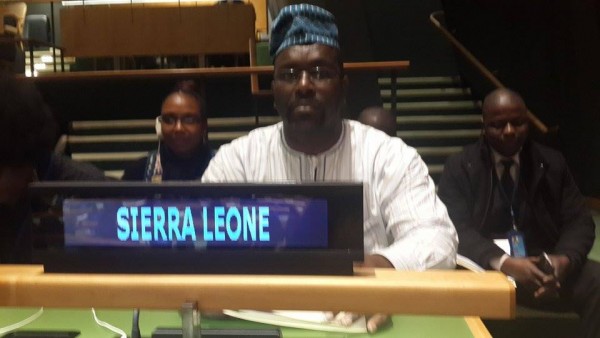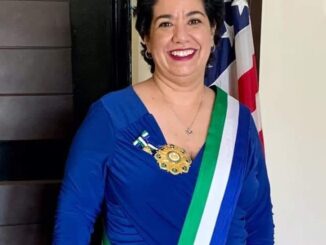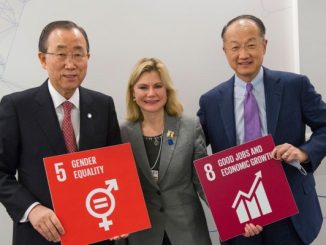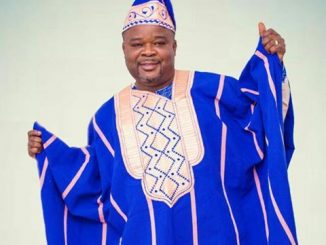
“My country was still grappling with the relics of a decade-long devastating civil conflict when the Ebola epidemic struck. Yet, government sufficiently demonstrated its political will, and continues to do so in spite of the many challenges, to ensure that we register significant gains towards the implementation of the BDPfA.”
Read full statement below :
PERMANENT MISSION OF THE REPUBLIC OF SIERRA LEONE TO THE UNITED NATIONS
245 East 49th Street, New York NY 10017
STATEMENT by HIS EXCELLENCY ALHAJI MOIJUE KAIKAI
Minister of Social Welfare, Gender and Children’s Affairs
of the Republic of Sierra Leone at the
Fifty-Ninth Session of the
Commission on the Status of Women (CSW)
New York, 12th March, 2015
Madam Chair,
Excellencies,
Distinguished Delegates,
Ladies and Gentlemen,
Permit me to extend our wholehearted congratulations to you as Chair of this historic event – the 59th Session of the UN Commission on the Status of Women, commemorating two decades since the adoption of the Beijing Declaration and Platform for Action (BDPfA). I assure you of our fullest cooperation and support throughout the Session.
Madam Chair, Distinguished Delegates,
My country was still grappling with the relics of a decade-long devastating civil conflict when the Ebola epidemic struck. Yet, government sufficiently demonstrated its political will, and continues to do so in spite of the many challenges, to ensure that we register significant gains towards the implementation of the BDPfA.
We welcome the convening of this meeting, which we view as another opportunity to share with the rest of the world some of the major strides we have taken towards the attainment of the goals of gender equality and the empowerment of our women, our many constraints notwithstanding. In that respect, my delegation believes the theme – “Beijing +20 – Progress, Achievements and challenges in its implementation” – is timely in view of the upcoming adoption of the Post-2015 Development Agenda. For want of time, let me hasten to summarize some of the practical measures we have taken so far, at both the normative and operative levels, highlight the major challenges we have faced in recent times as well as proffer some suggestions on the way forward.
Measures taken at the normative level
- We are a state party to the CEDAW and have so far fulfilled our reporting obligation by submitting six (6) periodic reports to the CEDAW Committee;
- We have adopted a National Action Plan on UN Security Council resolutions 1325 and 1820 as a show of commitment to address the impact of war on women, encourage women’s contribution to conflict resolution and sustainable peace, as well as to address the issue of Gender Based Violence; and
- We have updated our reports to the African Union on the AU Heads of State Solemn Declaration on Gender Equality in Africa.
Measures taken at the operative level
Regarding implementation, we have enacted relevant legislations and adopted several administrative measures in compliance with the provisions of the BDPfA as well as other relevant international frameworks relating to gender equality and women’s empowerment, including:
- The Education Act 2004; Anti-Human Trafficking Act 2005; the Domestic Violence Act 2007, the Devolution of Estates Act 2007; the Child Rights Act 2007; the Registration of Customary Marriage and Divorce Act 2009; Sexual Offences Act 2012, among others.
- Cabinet Ministers sign annual performance contracts with His Excellency the President. It demands quarterly reporting on their implementation of the mainstreaming of substantive gender issues meant to consist of 20 percent of each Ministry’s planned activities.
2
- Establishment of agricultural business units across the country, majority of which are headed by female farmers. In fact, some of the females are master farmers.
- Free girl child education from primary to junior secondary school level with special measures to be provided for Ebola affected children
- Free healthcare for pregnant women, lactating mothers and children under five to be enhanced
- In compliance with national policy of mainstreaming gender in national development programming, all Ministries, Departments and Agencies of Government are required to allot 20 percent of their annual budget to gender issues
- A Draft Bill on Gender Equality and Women’s Empowerment is being developed, which will address the issue of a minimum 30 percent quota for women in governance and decision-making.
- Several appointments has been made in favour of women
- Establishment of a women’s empowerment fund by the government of Sierra Leone
Key Challenges
- Under resourcing of the national machinery for the advancement of women, at both national and global levels. Reversals in the progress towards the attainment of Gender Equality and Women’s Empowerment fuelled by Ebola outbreak
- Persistent poverty, which has persistent impact on women and children.
- Inadequate data and statistics, disaggregated by age, sex and gender to inform better planning
- Challenges in the effective implementation of legal and normative instruments on women’s human rights
Madam Chair,
As you may be aware, Sierra Leone continues to be affected by Ebola Virus Disease (EVD), which has seriously impacted on the social, economic and cultural lives of the people. Over ten thousand people have been infected by the virus and there are over three thousand survivors. The government and people of Sierra Leone appreciate the support of the international community. We have just celebrated the International Women’s Day in my country with the theme: “Make it happen for EVD Affected Families, especially Women and Girls”. My delegation includes a female EVD survivor who will be telling her own story.
From a multisector impact assessment study of the gender dimension of the EVD undertaken by Government, in collaboration with UNWOMEN, Statistics Sierra Leone and Oxfam GB, in Sierra Leone, it was found that 56.7 percent of females were infected by Ebola as at December 2014, compared to 43.3 percent of males. The constituent I represent in government (women and children) are the greatest hit by the Ebola epidemic, requiring gender and child protection programmes.
I would therefore like to appeal to the International Community for special consideration of the gender and child protection aspects in further support programmes of the UNCT and other development partners in implementing the national socio-economic Ebola Recovery Strategy.
Thank you all.



